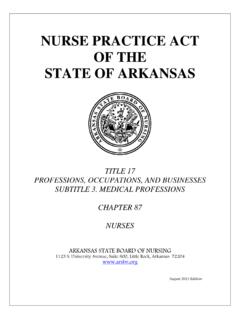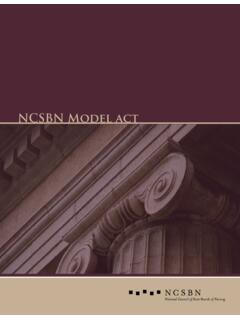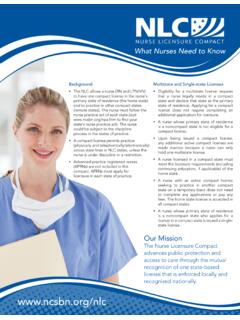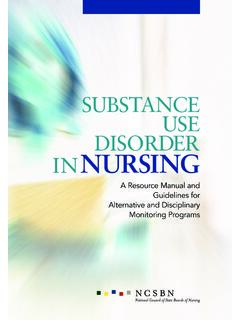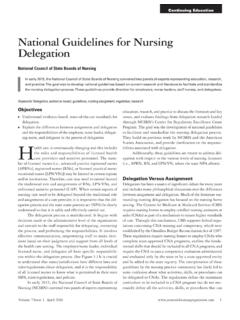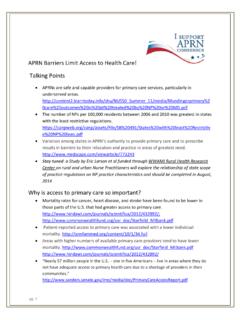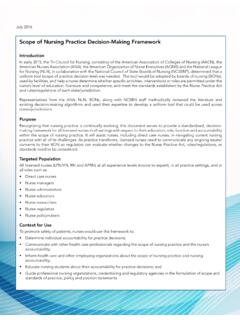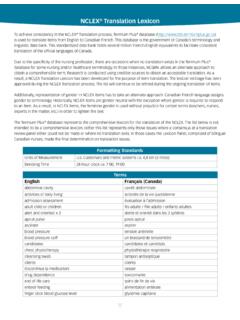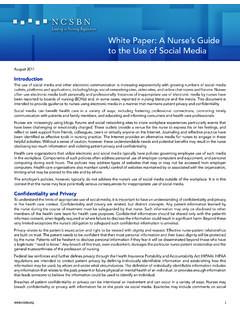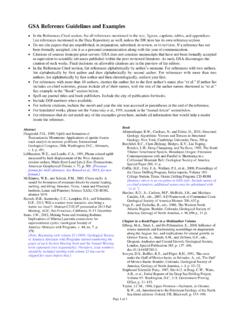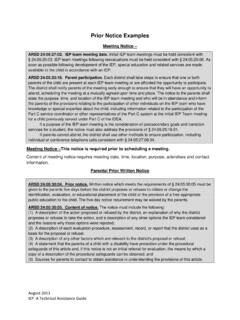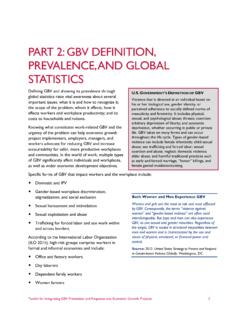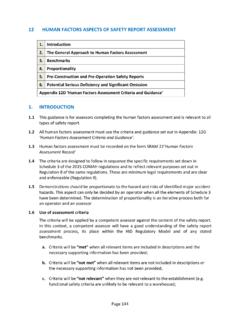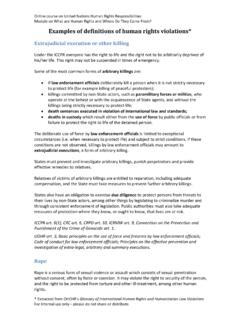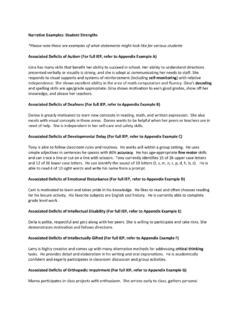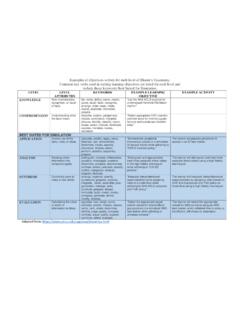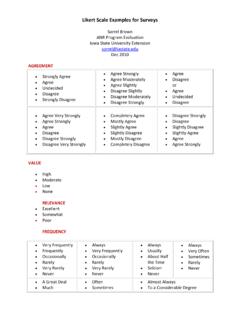Transcription of Advanced Practice Registered Nurse Compact
1 1 Advanced Practice Registered Nurse Compact Adopted by NCSBN Delegate Assembly August 12, 2020 ARTICLE I Findings and Declaration of Purpose a. The party states find that: 1. The health and safety of the public are affected by the degree of compliance with APRN licensure requirements and the effectiveness of enforcement activities related to state APRN licensure laws; 2. Violations of APRN licensure and other laws regulating the Practice of nursing may result in injury or harm to the public; 3.
2 The expanded mobility of APRNs and the use of Advanced communication and intervention technologies as part of our nation s health care delivery system require greater coordination and cooperation among states in the areas of APRN licensure and regulation; 4. New Practice modalities and technology make compliance with individual state APRN licensure laws difficult and complex; 5. The current system of duplicative APRN licensure for APRNs practicing in multiple states is cumbersome and redundant for healthcare delivery systems, payors, state licensing boards, regulators and APRNs; 6.
3 Uniformity of APRN licensure requirements throughout the states promotes public safety and public health benefits as well as providing a mechanism to increase access to care. b. The general purposes of this Compact are to: 1. Facilitate the states responsibility to protect the public s health and safety; 2. Ensure and encourage the cooperation of party states in the areas of APRN licensure and regulation, including promotion of uniform licensure requirements; 3. Facilitate the exchange of information between party states in the areas of APRN regulation, investigation and adverse actions; 4.
4 Promote compliance with the laws governing APRN Practice in each jurisdiction; 2 5. Invest all party states with the authority to hold an APRN accountable for meeting all state Practice laws in the state in which the patient is located at the time care is rendered through the mutual recognition of party state privileges to Practice ; 6. Decrease redundancies in the consideration and issuance of APRN licenses; and 7. Provide opportunities for interstate Practice by APRNs who meet uniform licensure requirements.
5 ARTICLE II Definitions As used in this Compact : a. Advanced Practice Registered Nurse or APRN means a Registered Nurse who has gained additional specialized knowledge, skills and experience through a program of study recognized or defined by the Interstate Commission of APRN Compact Administrators ( Commission ), and who is licensed to perform Advanced nursing Practice . An Advanced Practice Registered Nurse is licensed in an APRN role that is congruent with an APRN educational program, certification, and Commission rules.
6 B. Adverse action means any administrative, civil, equitable or criminal action permitted by a state s laws which is imposed by a licensing board or other authority against an APRN, including actions against an individual s license or multistate licensure privilege such as revocation, suspension, probation, monitoring of the licensee, limitation on the licensee s Practice , or any other encumbrance on licensure affecting an APRN s authorization to Practice , including the issuance of a cease and desist action.
7 C. Alternative program means a, non-disciplinary monitoring program approved by a licensing board. d. APRN licensure means the regulatory mechanism used by a party state to grant legal authority to Practice as an APRN. e. APRN uniform licensure requirements" means the minimum uniform licensure, education and examination requirements set forth in Article of this Compact . f. Coordinated licensure information system means an integrated process for collecting, storing and sharing information on APRN licensure and enforcement activities related to APRN licensure laws that is administered by a nonprofit organization composed of and controlled by licensing boards.
8 G. Current significant investigatory information means: 3 1. Investigative information that a licensing board, after a preliminary inquiry that includes notification and an opportunity for the APRN to respond, if required by state law, has reason to believe is not groundless and, if proved true, would indicate more than a minor infraction; or 2. Investigative information that indicates that the APRN represents an immediate threat to public health and safety regardless of whether the APRN has been notified and had an opportunity to respond.
9 H. Encumbrance means a revocation or suspension of, or any limitation on, the full and unrestricted Practice of nursing imposed by a licensing board in connection with a disciplinary proceeding. i. Home state means the party state that is the APRN s primary state of residence. j. Licensing board means a party state s regulatory body responsible for regulating the Practice of Advanced Practice Registered nursing. k. Multistate license means an APRN license to Practice as an APRN issued by a home state licensing board that authorizes the APRN to Practice as an APRN in all party states under a multistate licensure privilege, in the same role and population focus as the APRN is licensed in the home state.
10 L. Multistate licensure privilege means a legal authorization associated with an APRN multistate license that permits an APRN to Practice as an APRN in a remote state, in the same role and population focus as the APRN is licensed in the home state. m. Non-controlled prescription drug means a device or drug that is not a controlled substance and is prohibited under state or federal law from being dispensed without a prescription. The term includes a device or drug that bears or is required to bear the legend Caution: federal law prohibits dispensing without prescription or prescription only or other legend that complies with federal law.
